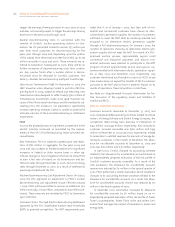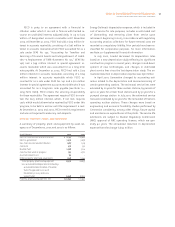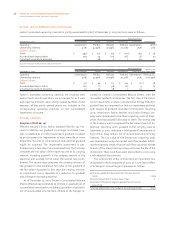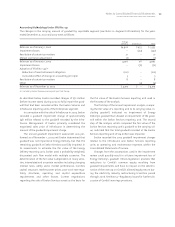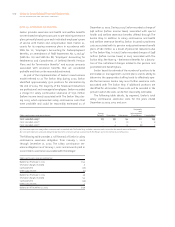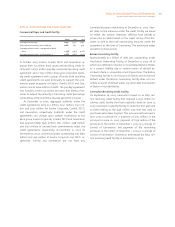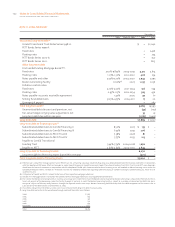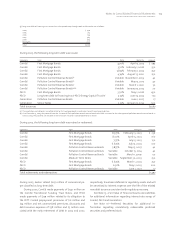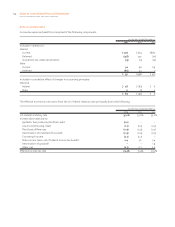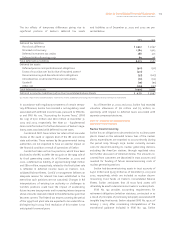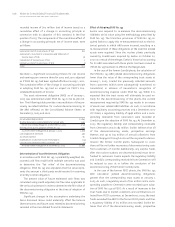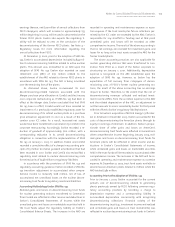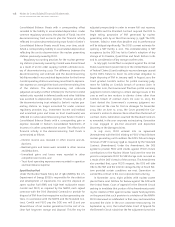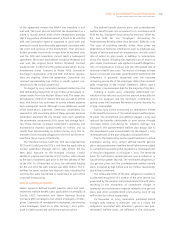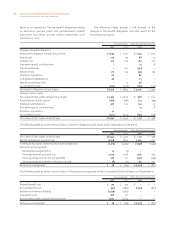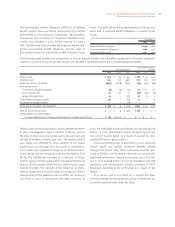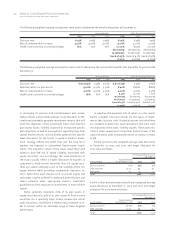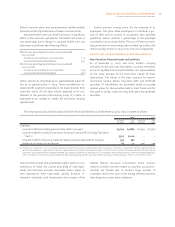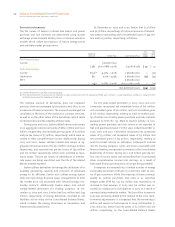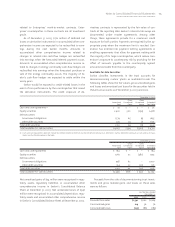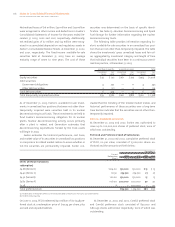ComEd 2003 Annual Report Download - page 108
Download and view the complete annual report
Please find page 108 of the 2003 ComEd annual report below. You can navigate through the pages in the report by either clicking on the pages listed below, or by using the keyword search tool below to find specific information within the annual report.
106 Notes to Consolidated Financial Statements
EXELON CORPORATION AND SUBSIDIARY COMPANIES
recorded income of $112 million (net of income taxes) as a
cumulative effect of a change in accounting principle in
connection with its adoption of this standard in the first
quarter of 2003. The components of the cumulative effect of
a change in accounting principle, net of income taxes, were
as follows:
Generation (net of income taxes of $52) $80
Generation’s investments in AmerGen and Sithe (net of
income taxes of $18) 28
ComEd (net of income taxes of $0) 5
Enterprises (net of income taxes of $(1)) (1)
Total $112
See Note 1—Significant Accounting Policies for net income
and earnings per common share for 2002 and 2001, adjusted
as if SFAS No. 143 had been applied effective January 1, 2001.
The cumulative effect of the change in accounting principle
in adopting SFAS No. 143 had no impact on PECO’s Con-
solidated Statements of Income.
The asset retirement obligation (ARO) as of January 1,
2003 was determined under SFAS No. 143 to be $2,366 mil-
lion. The following table provides a reconciliation of the pre-
viously recorded liabilities for nuclear decommissioning to
the ARO reflected on the Consolidated Balance Sheets at
December 31, 2003 and 2002:
Accumulated depreciation $2,845
Nuclear decommissioning liability for retired units 1,293
Decommissioning obligation at December 31, 2002 4,138
Net reduction due to adoption of SFAS No. 143 1,772
Asset retirement obligation at January 1, 2003 2,366
Consolidation of AmerGen 487
Accretion expense 161
Expenditures to decommission retired plants (14)
Classification of Thermal ARO as held for sale (3)
Asset retirement obligation at December 31, 2003 $2,997
Determination of Asset Retirement Obligation
In accordance with SFAS No. 143, a probability-weighted, dis-
counted cash flow model with multiple scenarios was used
to determine the “fair value” of the decommissioning
obligation. SFAS No. 143 also stipulates that fair value repre-
sents the amount a third party would receive for assuming
an entity’s entire obligation.
The present value of future estimated cash flows was
calculated using credit-adjusted, risk-free rates applicable to
the various businesses in order to determine the fair value of
the decommissioning obligation at the time of adoption of
SFAS No. 143.
Significant changes in the assumptions underlying the
items discussed above could materially affect the balance
sheet amounts and future costs related to decommissioning
recorded in the consolidated financial statements.
Effect of Adopting SFAS No. 143
Exelon was required to re-measure the decommissioning
liabilities at fair value using the methodology prescribed by
SFAS No. 143. The transition provisions of SFAS No. 143 re-
quired Exelon to apply this re-measurement back to the his-
torical periods in which AROs were incurred, resulting in a
re-measurement of these obligations at the date the related
assets were acquired. Since the nuclear plants previously
owned by ComEd were acquired by Exelon on October 20,
2000 as a result of the Merger, Exelon’s historical accounting
for its ARO associated with those plants has been revised as
if SFAS No. 143 had been in effect at the Merger date.
In the case of the former ComEd plants, the calculation of
the SFAS No. 143 ARO yielded decommissioning obligations
lower than the value of the corresponding trust assets at
January 1, 2003. ComEd has previously collected amounts
from customers (which were subsequently transferred to
Generation) in advance of Generation’s recognition of
decommissioning expense under SFAS No. 143. While it is
expected that the trust assets will ultimately be used en-
tirely for the decommissioning of the plants, the current
measurement required by SFAS No. 143 results in an excess
of assets over related ARO liabilities. As such, in accordance
with regulatory accounting practices and a December 2000
ICC Order, a regulatory liability of $948 million and a corre-
sponding receivable from Generation were recorded at
ComEd upon the adoption of SFAS No. 143. At December 31,
2003, the regulatory liability and corresponding receivable
from Generation was $1,183 million. Exelon believes that all
of the decommissioning assets, prospective earnings
thereon and up to $73 million of annual collections from
ComEd ratepayers through 2006 will be required to decom-
mission the former ComEd plants. Subsequent to 2006,
there will be no further recoveries of decommissioning costs
from customers of ComEd. Additionally, any surplus funds
after the nuclear stations are decommissioned must be re-
funded to customers. Exelon expects the regulatory liability
and ComEd’s corresponding receivable from Generation will
be reduced to zero at or before the conclusion of the
decommissioning of the former ComEd plants.
In the case of the former PECO plants, the SFAS No. 143
ARO calculation yielded decommissioning obligations
greater than the corresponding trust assets at January 1,
2003. As such, a regulatory asset of $20 million and a corre-
sponding payable to Generation were recorded upon adop-
tion of SFAS No. 143 at PECO. As a result of increases in the
trust funds due to market conditions and contributions col-
lected from PECO customers, at December 31, 2003, the trust
funds exceeded the ARO for the former PECO plants and thus
a regulatory liability of $12 million was recorded. Exelon be-
lieves that all of the decommissioning assets, prospective


